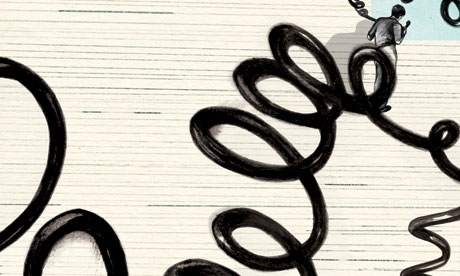
The appallingness of corporate customer service departments is such a dependable cliché of modern life that stand-up comedians who make jokes on the topic are liable to leave their audiences feeling cheated. (Not that those audiences can do much about it. Have you ever tried calling Ticketmaster's refunds line?) A less frequently made observation is that the contempt with which we're so regularly treated – the hours spent in the vortex of touch-tone systems, the near-death experience of the unexpected, cheerily robotic, "Goodbye!" – makes a brutal kind of sense. It pays for companies to shower most attention on the customers they don't yet have, with the result that it's often the most loyal patrons who receive the worst service. As James Surowiecki noted in the New Yorker recently, consultants call this the "efficient relationship paradox": "It's only once you've actually become a customer that companies put efficiency ahead of attention." And though you're ill-advised to mention this when you've been holding for 20 minutes, we're arguably all to blame: it's our appetite for low prices that puts the squeeze on service. We have met the enemy – or yelled obscenities at its prerecorded voice, anyway – and it is us.
A similar problem affects romantic and social relationships. Here we dispense with the jargon and just call it "taking people for granted" – yet the efficient relationship paradox is what's happening when someone cultivates sparkling conversation and an attractive appearance to impress as-yet-unspecified others, only to give up once a relationship's established. It's also what's happening when a certain friend of mine keeps me waiting for more than an hour. Taking for granted, the self-help world seems certain, is a Very Bad Thing, the cause of marriage break-ups and more.
Yet there's a problem here, because there's something about taking people for granted that's indicative of a good relationship. A boyfriend or girlfriend constantly demonstrating how lucky they feel, and striving to be worthy, smacks of insecurity; the very best friendships are the ones that can be neglected for months in the sure knowledge that the bond can be renewed in moments. I half-like the fact that my chronically late friend feels so secure in the strength of our friendship that he doesn't fear his lateness might imperil it. "Being taken for granted can be a compliment," observed the veteran American agony aunt Joyce Brothers. "It means you've become a comfortable, trusted element in another person's life." (This is even sometimes true where companies are concerned, and Surowiecki's own publication is a case in point: every other week, it seems, I receive a subscription renewal reminder from the New Yorker, a magazine I love fiercely; I wish I could convince it my loyalty doesn't require its ceaseless prodding.)
This isn't to endorse complacency, but merely to note that striving to maintain and improve relationships can sometimes defeat the object, which is surely to create a container in which the parties can be authentically, non-strugglingly, themselves. Memo to my bank: this doesn't apply to you. You never used to experience "unusually high call volumes" before we became an item. Now you're always making seductive offers, but only to new customers. Don't think I haven't noticed.
oliver.burkeman@theguardian.com

